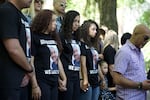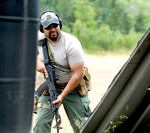
Jason Washington's family holds a press conference on the Portland State University campus on the week anniversary of his death.
Ericka Cruz Guevarra / OPB
David O’Bryant has done a lot of things in his life to protect himself. He’s studied self-defense. He’s taken time to learn about white supremacist groups that operate in Oregon.
And he bought a gun.
“I do think that it behooves marginalized communities to at least explore the possibilities of firearms for self-defense,” O’Bryant said.
O'Bryant is among many people reflecting on the complex interplay of firearm ownership and the realities of being black in Oregon, following the shooting death of Jason Washington in June.
Washington was a Navy veteran, a grandfather and licensed to carry a concealed handgun. He was shot and killed by Portland State University campus police in the early morning hours of June 29. Investigators have said little since the incident, but witnesses said Washington was attempting to break up a fight when his handgun fell from his side.
Video of the shooting shows Washington appearing to reach for his firearm, someone shouting "gun," and then police opening fire.
According to the Washington Post's "Fatal Force Project," police have killed at least 110 black people in America in 2018, as of early July. But Washington's death doesn't fit neatly into the national discussion of unarmed black men being gunned down by police.
By Andre Washington's account, his brother Jason was a supporter of the Second Amendment, social issues and "perhaps the most ironic of them all is [he] supported the police."
"When there's this demand for public safety, like having armed officers on PSU's campus in the first place, mixed with an underlying culture that allows implicit anti-blackness to create a perception of black men as a threat, it results in this kind of thing," O'Bryant said, "even when you have … somebody who has a concealed carry license ostensibly to defend themselves and others around them."
O'Bryant, a PSU graduate himself, said he thought about the risks that come along with being black and carrying a gun in Oregon before he ever bought a weapon.
Washington's death hasn't changed how he feels.
"There's definitely a component of risk that could be read into being armed and black. However, that risk doesn't disappear because you are unarmed," he said. "That risk is present because you are living in a culture that promotes anti-black bias."
Who Is Buying Guns
The reasons Oregonians buy guns can vary significantly, from personal protection to hunting, target shooting and collecting. Regardless of the reason, statistics show gun ownership in the state climbing significantly over the past decade.
According to the Bureau of Alcohol, Tobacco and Firearms, the number of weapons in Oregon registered under the National Firearms Act nearly doubled in the last eight years — from 35,718 in 2010 to 66,346 in early 2018.
Justin Davis is among those Oregonians who bought a gun in that time period. “It’s just fun to go around and target shoot — and to know that if I had to be put in a spot where I had to defend my family, I could,” he said.
Davis is black and lives in Lake County, one of Oregon’s most sparsely populated areas. He said he’s conscious of his race in Lake County, an area that is even more overwhelmingly white than the state as a whole. Still, Davis said his race isn’t the reason he owns a gun.

Isaac Fearn is a licensed firearms instructor who lives in Beaverton. He says he gained his appreciation for guns after he served in the Marines.
Provided by Isaac Fearn
“I don’t think I needed to buy a gun to protect myself from (racists),” Davis said, adding that he would always focus on de-escalation before turning to a firearm. “The last thing you should want to do is shoot somebody. I own guns, and that’s the last thing I want to do.”
It's not clear how many African-American Oregonians own guns because the state does not release demographic data on gun ownership due to privacy laws. But a 2017 survey by the Pew Research Foundation showed a third of black households in America do have a gun. For whites, that number is closer to 50 percent.
Gun rights groups for people of color have also seen significant growth in recent years alongside the emboldening of hate groups, such as those that marched at the infamous "Unite the Right" rally in Charlottesville, Virginia. NPR reports that the National African American Gun Association's membership tripled after the inauguration of President Trump.
For Davis, Washington's death at the hands of police and the question of whether his race played a factor is unsettling.
"The fact that people feel the need to interview African American gun owners in 2018, it creates a bad feeling in my stomach," Davis said. "I had kind of thought we'd be further than this at this point."
Ultimately, Davis said he'd like to see Americans find common ground solutions to deal with gun violence.
Second Amendment For All
Washington's death, much like the 2016 shooting of Philando Castile by a Minnesota police officer, highlights a rift within the gun rights community over issues of race and officer-involved shootings.
The National Rifle Association faced criticism from some of its members after Castile's death because it did not speak out strongly in support of Castile, who legally owned a firearm and was shot by a police officer after he told the officer the handgun was in the car.
While NRA spokeswoman Dana Loesch called Castile's death a "terrible tragedy that could have been avoided," she also questioned his right to carry the gun because of a small amount of cannabis in his car at the time of the shooting.
"Carrying firearm w controlled substance is not 'lawful carry.' Important," Loesch said to her critics on Twitter.
Similarly, Loesch said Washington bore responsibility for his death. In an interview on NRA TV with California attorney Chuck Michel, Loesch said Washington should have backed away from the situation.
"When police are already there on scene, I think you have to question do you need to be involved anymore at that point?" she asked.
Michel agreed with the sentiment.
"You can't assume the police won't see you as a threat," he said. "Let them deal with it. I mean, I hate to blame it on Washington, but he is not blameless in this situation."
Both Loesch and Michel are white.
But some black Oregonians agree with the notion that police made the right call during the PSU incident.
"If you drop your weapon in the presence of an officer of the law, you should probably back away, because they're the only ones that can really fire a firearm at that point," said Donny Adair, a Portlander who regularly takes African Americans out to teach them how to hunt game.
Portland Police are still investigating Washington's shooting and have not released any information, so it's unclear exactly what happened in the moments before the death.
Adair said the same basic rules apply to anyone who decides to carry a concealed weapon, regardless of race.
"Maybe he was trying to keep someone else from getting it or something like that. But it's hard for me to say that this is anything but an unfortunate circumstance," Adair said.
The Oregon Firearms Federation, a political advocacy group, did not issue an official statement after Washington's death. But the rift in the guns community over race and concealed handgun licenses did play out on the group's Facebook page after it posted a link to a news story on the shooting with the caption "Not good."
"Cop needs to lose his job. Very sad," one user wrote.
"Great. Now we will hear how racist everyone is," wrote another.
The Talk
Isaac Fearn’s father taught him how to handle a gun when he was 8. But he didn’t get into gun culture until after he joined the Marines in 2011.
Fearn said shortly after he returned from deployment to his wife and newborn son, someone attempted to break into their home. He decided to buy a shotgun as a "budget" security system.
"After that, I actually built my first AR," Fearn said, who now has a firearms instructor certification and teaches people gun safety.
Fearn, who wore a T-shirt adorned with the image of an AR-15 and the words "Come and Take It" during an interview, said he's disappointed that the NRA and other gun organizations don't do more to support people of color who use their Second Amendment rights.

Isaac Fearn is a licensed firearms instructor who lives in Beaverton. He says carrying a gun offers him and his family protection.
Provided by Isaac Fearn
“It’s like, ‘We are here trying to support you guys as well, why don’t we get the same support back?’” Fearn said. “It is our constitutional right to keep and bear arms.”
He said lobbying organizations such as the NRA spend an inordinate amount of time focused on
political battles with the left
, instead of working on solutions to prevent loss of life.
“We need to sit down and talk about it versus the right and the left fighting each other about it,” Fearn said.
To prevent another death like Washington or Castile, Fearn said he’d like to see training for police officers that emphasizes de-escalation and conflict resolution. Weapon use, he said, should be a last resort tactic.
“I’ve always had a friendly interaction with [police officers],” Fearn said, “but as far as the whole racial bias thing, I believe it’s there. I really do.”
Even after the PSU incident, Fearn said he still believes in more people of color owning guns for their own protection and having armed guards on school campuses to protect against mass shootings.
He plans to take his son, now 3, shooting someday.
But he also plans to have “the talk” on how to handle encounters with police.
“As far as dealing with the police, don’t have your hands by your side. Hold your hands by your chest, indicating you’re not reaching for anything,” Fearn said without pause.
It’s a conversation had countless times across the country. Gun ownership just adds another dimension to it.
“It’s going to be a tough conversation to have with him,” Fearn said, “but at the same time, he does need to be aware that you are a person of color in today’s America, right now.”

Sharing America: A Public Radio Collaboration
Erica Morrison is part of the public radio collaborative “Sharing America,” covering the intersection of race, identity and culture. This new initiative, funded by the Corporation for Public Broadcasting, includes reporters in the Northwest and Hartford, Connecticut, St. Louis and Kansas City. You can find more "Sharing America" coverage here.